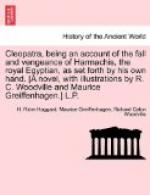Here I might not abide. So again I hired myself out as a sailor, giving my labour in return for passage, and we passed up the Nile. And I learned from the talk of men that Cleopatra had come back to Alexandria, drawing Antony with her and that they lived together with royal state in the palace on the Lochias. Indeed, the boatmen already had a song thereon, which they sang as they laboured at the oar. Also I heard how the galley that was sent to search for the vessel which carried the Syrian merchant had foundered with all her crew, and the tale that the Queen’s astronomer, Harmachis, had flown to Heaven from the roof of the house at Tarsus. And the sailors wondered because I sat and laboured and would not sing their ribald song of the loves of Cleopatra. For they, too, began to fear me, and mutter concerning me among themselves. Then I knew that I was a man accursed and set apart—a man whom none might love.
On the sixth day we drew nigh to Abouthis, where I left the craft, and the sailors were right glad to see me go. And, with a breaking heart, I walked through the fertile fields, seeing faces that I knew well. But in my rough disguise and limping gait none knew me. At length, as the sun sank, I came near to the great outer pylon of the temple; and here I crouched down in the ruins of a house, not knowing why I had come or what I was about to do. Like a lost ox I had strayed from far, back to the fields of my birth, and for what? If my father, Amenemhat, still lived, surely he would turn his face from me. I dared not go into the presence of my father. I sat hidden there among the broken rafters, and idly watched the pylon gates, to see if, perchance, a face I knew should issue from them. But none came forth or entered in, though the great gates stood wide; and then I saw that herbs were growing between the stones, where no herbs had grown for ages. What could this be? Was the temple deserted? Nay; how could the worship of the eternal Gods have ceased, that for thousands of years had, day by day, been offered in the holy place? Was, then, my father dead? It well might be. And yet, why this silence? Where were the priests: where the worshippers?
I could bear the doubt no more, but as the sun sank red I crept like a hunted jackal through the open gates, and on till I reached the first great Hall of Pillars. Here I paused and gazed around me—not a sight, not a sound, in the dim and holy place! I went on with a beating heart to the second great hall, the hall of six-and-thirty pillars where I had been crowned Lord of all the Lands: still not a sight or a sound! Thence, half fearful of my own footfall, so terribly did it echo in the silence of the deserted Holies, I passed down the passage of the names of the Pharaohs towards my father’s chamber. The curtain still swung over the doorway; but what would there be within?—also emptiness? I lifted it, and noiselessly passed in, and there in his carven chair at the table on which his long white beard flowed, sat my father, Amenemhat, clad in his priestly robes. At first I thought that he was dead, he sat so still; but at length he turned his head, and I saw that his eyes were white and sightless. He was blind, and his face was thin as the face of a dead man, and woeful with age and grief.




